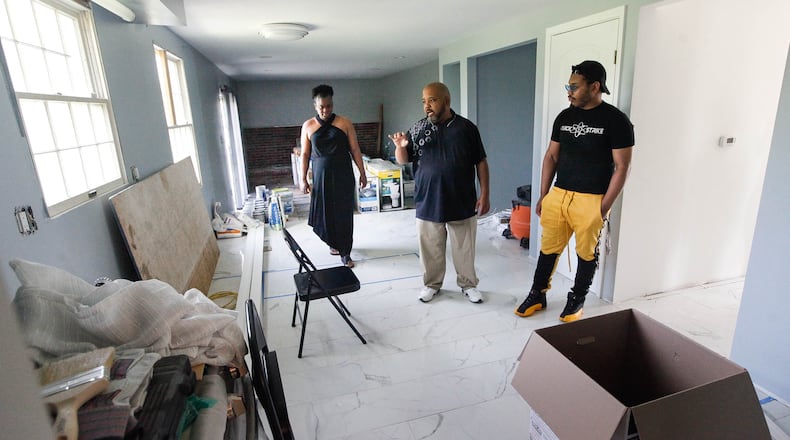“All I did was pray. My daughter cried. We all held hands,” Derrick said. “It was more than a freight train and it slammed into the house.”
After the house stopped shaking, Derrick went outside immediately.
“I looked in the distance and saw a black cloud with green lightning and it was just devastation everywhere,” he said.
Credit: SUBMITTED
Credit: SUBMITTED
The walls of their house shifted and more than 60% of their roof was gone, revealing the sky above.
“Not only did you see this sky, but you saw these stark outlines of trees,” Kandace said. “It was just very, very terrifying.”
The families’ three vehicles were damaged. Their neighbors’ houses looked the same or worse, with entire upper floors stripped of walls. In the days following the storm, water poured in from rain, causing yet more damage. The Stephens said 90% of the belongings they accumulated over 15 years were gone.
The couple had insurance and thought the process of rebuilding would go without a hitch. An adjuster came out right away. They filed claims and found a place to rent and thought they’d be back home within six to eight months.
They were mistaken.
Since the tornadoes hit two years ago this week, it’s been a long slog with their insurance company and fights with a no-show contractor under investigation by the Ohio Attorney General’s Office. Since the tornado, the Stephens have moved six times spending at least nine months of it with as many as six family members crammed together in a hotel room. A battle with COVID-19 put Derrick in the hospital and on a respirator fighting for his life in November.
The contractor who started the work stopped showing up and wasn’t responding to calls, and work came to a standstill last summer. Because no progress was being made, their insurance company wouldn’t provide more money. And the Stephens were tapped out of savings.
Credit: Chris Stewart
Credit: Chris Stewart
The couple finally sought assistance through the Miami Valley Long-Term Recovery Operations Group, which is finishing up the work on their house with other paid skilled contractors and volunteer labor.
“I didn’t think we would need them, because everything had gone so smoothly up until the last denials from the insurance company,” Kandace Stephens said. “I had no way of anticipating that we would still be this far from finished when we had to part company with our contractor.”
Kandace Stephens said more work has been accomplished on the house in the past three weeks by Brethren Disaster Ministries volunteers and the recovery group’s paid contractors than during the entire time since the tornado.
The past two years have been a curse and a blessing, Kandace Stephens said. They have been touched by the people they met at hotels who helped them quarantine through COVID, workers at the lumber yards, and now the volunteers helping them finish up the house.
“We all got to see how wonderful people really, truly can be in times of great distress. No one had to do any of what they did for us. And yet they did it anyway,” she said. “That was a wonderful balance to have all these people saying, ‘Hey, how can we help?’ in a time when we needed it most.”
The family expects to return home in July and join their neighbors once again for an annual block party.
“I’ll just be happy when they say we’re done,” Derrick Stephens said. “I can come home and walk around and be satisfied and lay in my own bed without having to worry about paying for a hotel stay or paying for an apartment.”
The Stephens said tornado survivors who still need help shouldn’t quit or feel embarrassed about reaching out for help.
“We’ve talked to people at Home Depot and Lowe’s and grocery stores that are still going through this and still being affected,” Derrick Stephens said. “It’s just a lot. I never would think that we’re the only ones left — not in a million years.”
About the Author



